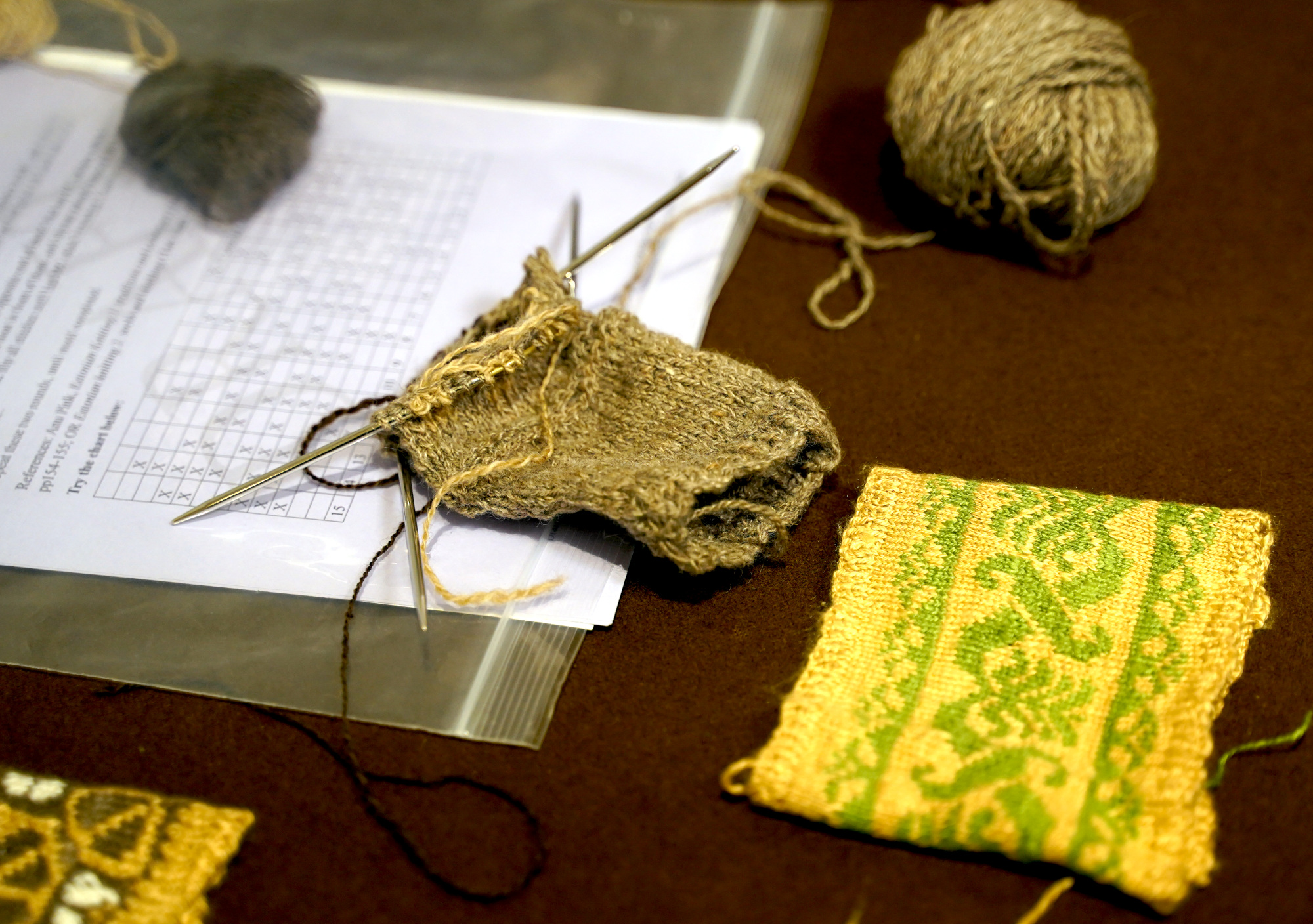
Knitted Liturgical Gloves: evidence revealed by reconstruction Lesley O’Connell Edwards from 2023 MEDATS event
DISTAFF (Discussion, Interpretation, and Study of Textile Arts, Fabrics, and Fashion), a group formed to sponsor sessions at Kalamazoo and Leeds on medieval and early modern textiles and dress, is seeking paper proposals for the International Congress on Medieval Studies at Kalamazoo, May 14–16, 2026 and The International Medieval Congress at Leeds, July 6–9, 2026. Some of these sessions will be co-sponsored by MEDATS.
The deadline to propose a paper for Leeds is 30 August and for Kalamazoo is 15 September, but please contact the respective organisers as soon as possible.
IMC Leeds
The International Medieval Congress at Leeds will be July 6–9, 2026, and will feature a special thematic strand on “Temporalities.” DISTAFF is seeking 20-minute presentations on any topic related to medieval dress and textiles. If you think you might want to present a paper, please send a title/topic and a two-sentence synopsis to Gale Owen-Crocker at gale.owencrocker@ntlworld.com no later than August 30.
Experienced DISTAFF attendees who have been to Leeds and would like to assist Gale with session organization, or who have a specific idea for a themed session, should contact Gale directly.
For details on the Leeds Congress, see https://www.imc.leeds.ac.uk/
ICMS Kalamazoo
The 61st International Congress on Medieval Studies will take place Thursday, May 14, through Saturday, May 16, 2026. DISTAFF is seeking 20-minute paper presentations on topics that align with the session themes below. Deadline for proposals to be uploaded to the submission portal is September 15, but please do not wait till then; if you encounter technical delays, you may need time to sort them out. If you want to discuss your ideas before you refine your submission, e-mail distaff.org@gmail.com, as soon as possible. If you aren’t sure whether your topic will fit into one of our themes, there’s a good chance we can make it work.
Session themes
Dress and Textiles (1): Clothing as Signifier.
This is an on-site, in-person session. Any scholarly approach to medieval or early modern clothing is welcome, and papers may focus on the use and interpretation of dress or textiles as social or status indicators in art, literature, or real life.
Dress and Textiles (2): Techniques and Tools (co-sponsored with MEDATS).
This is a hybrid session, so presenters can be on-site or virtual. Papers may consider any type of clothing items or textiles of the medieval and early modern periods, but the focus should be on the methods by which these were made and/or the tools involved in their creation, as supported by written, visual, and archaeological evidence from the period. We especially value the use of physical examples and reconstructions.
Dress and Textiles (3): Textiles in Texts.
This is an on-site, in-person session. This session is designed to showcase new research on dress and textile references in a range of document types. We particularly encourage interdisciplinary analyses that contextualize and illuminate the written references with complementary data from other types of sources.
Submitting a Paper Proposal
Information and a link to the submissions portal are here: https://wmich.edu/medievalcongress/call. To find the DISTAFF sessions in the submissions portal, look under “Events by Sponsoring Organization.” We are, oddly, at the start of the D’s. If you have any difficulty, please e-mail us at sooner rather than later.
After you enter your information through the portal, please e-mail us so we can verify we received it; occasionally a proposal goes to the wrong place.
Note that one of our sessions (“Techniques and Tools”) was granted hybrid status (meaning speakers can be attending either in person or virtually). The others are traditional in-person sessions. If you hoped to speak for us but can do so only virtually, please message us to discuss; we have some flexibility in how we schedule speakers. If we have an abundance of virtual speakers and a shortage of in-person ones, there is a chance we can switch a session to virtual.